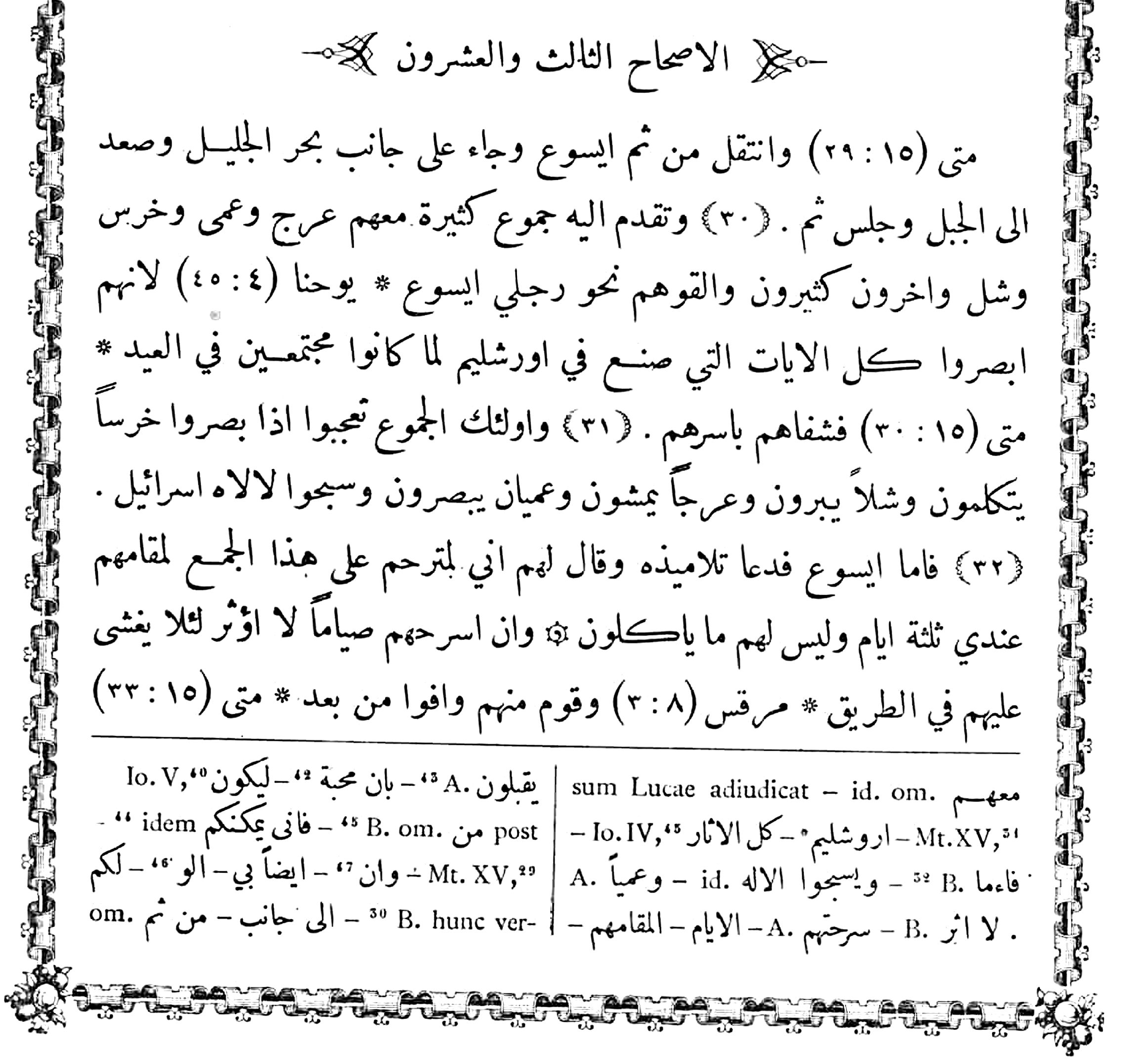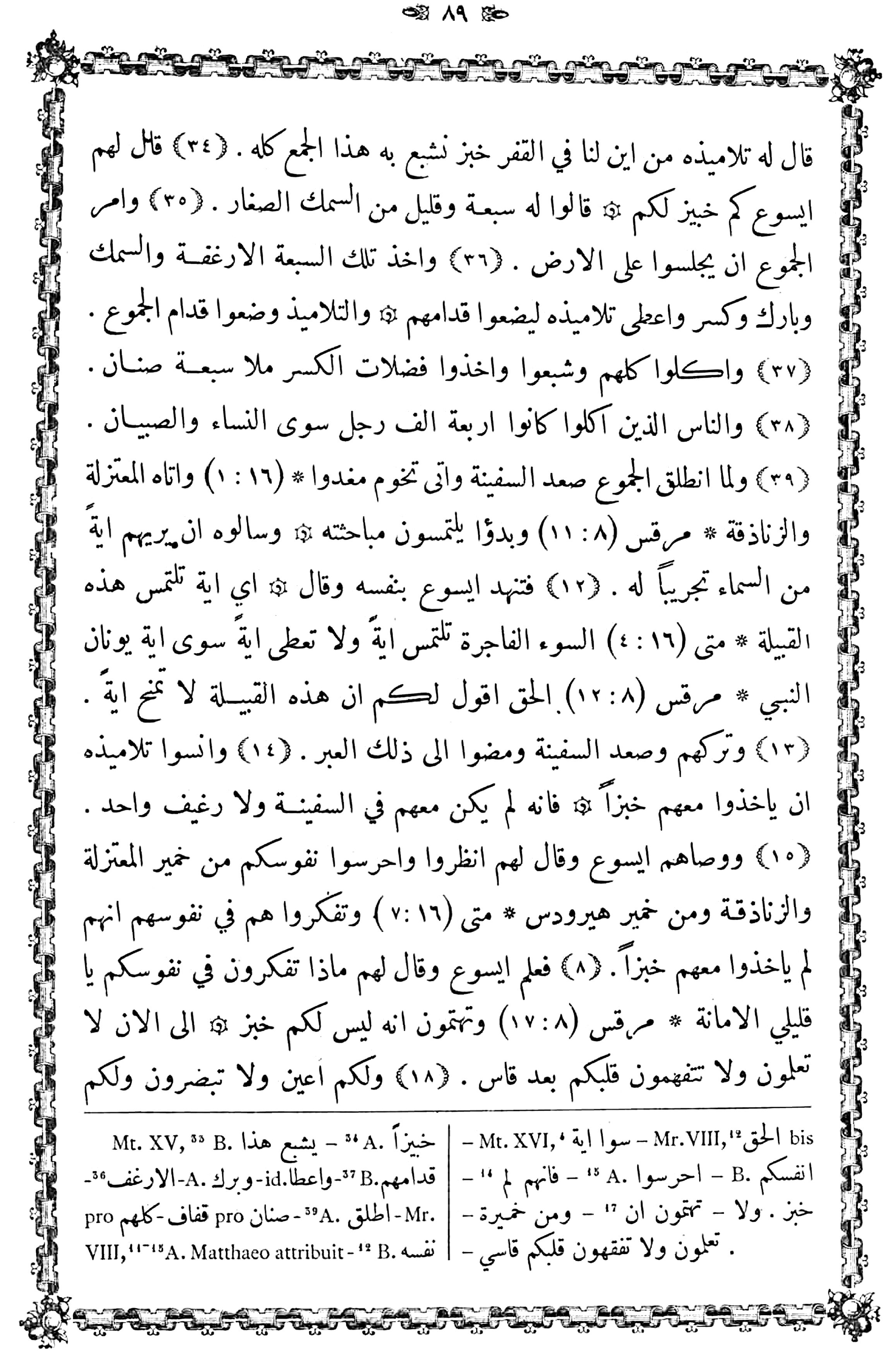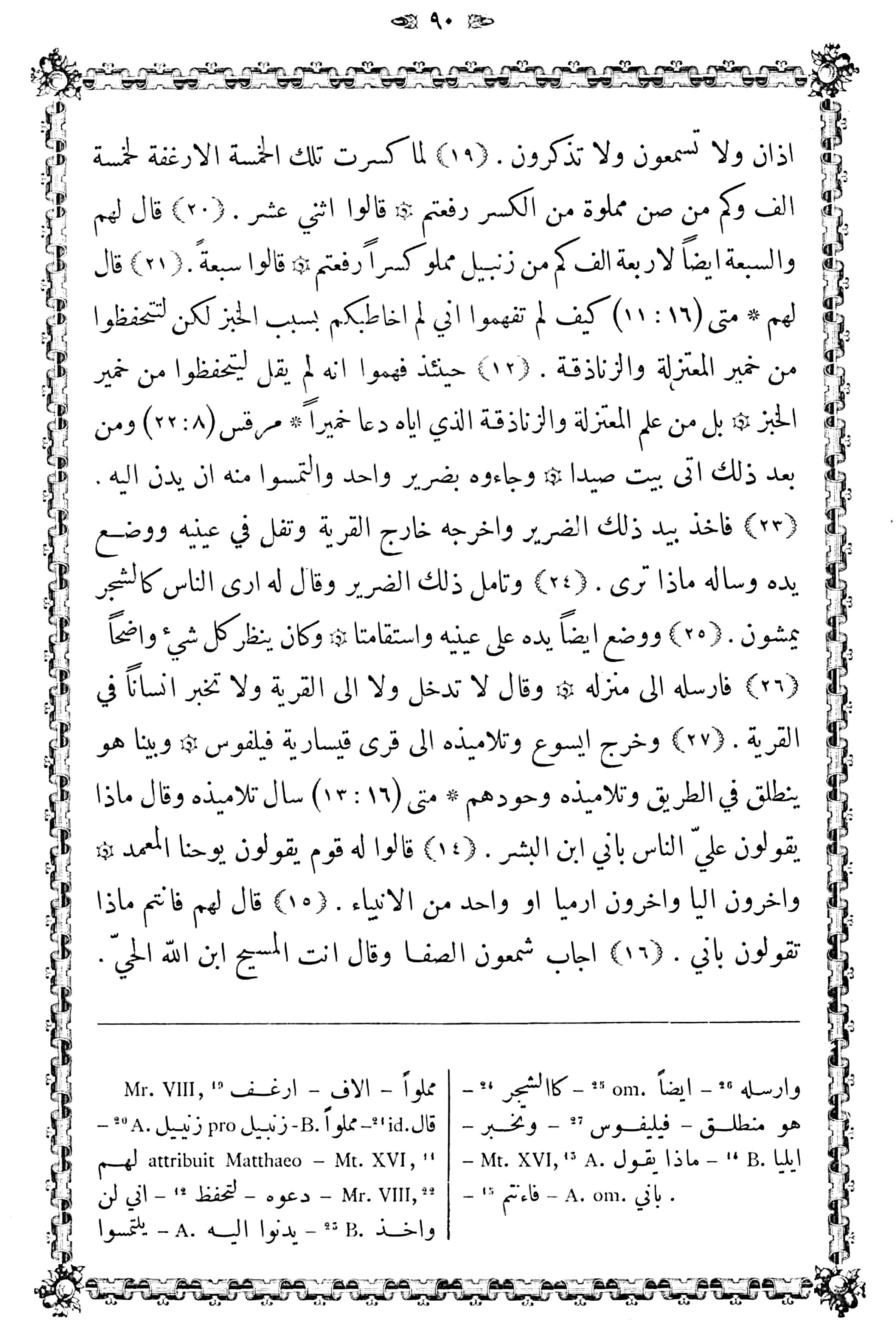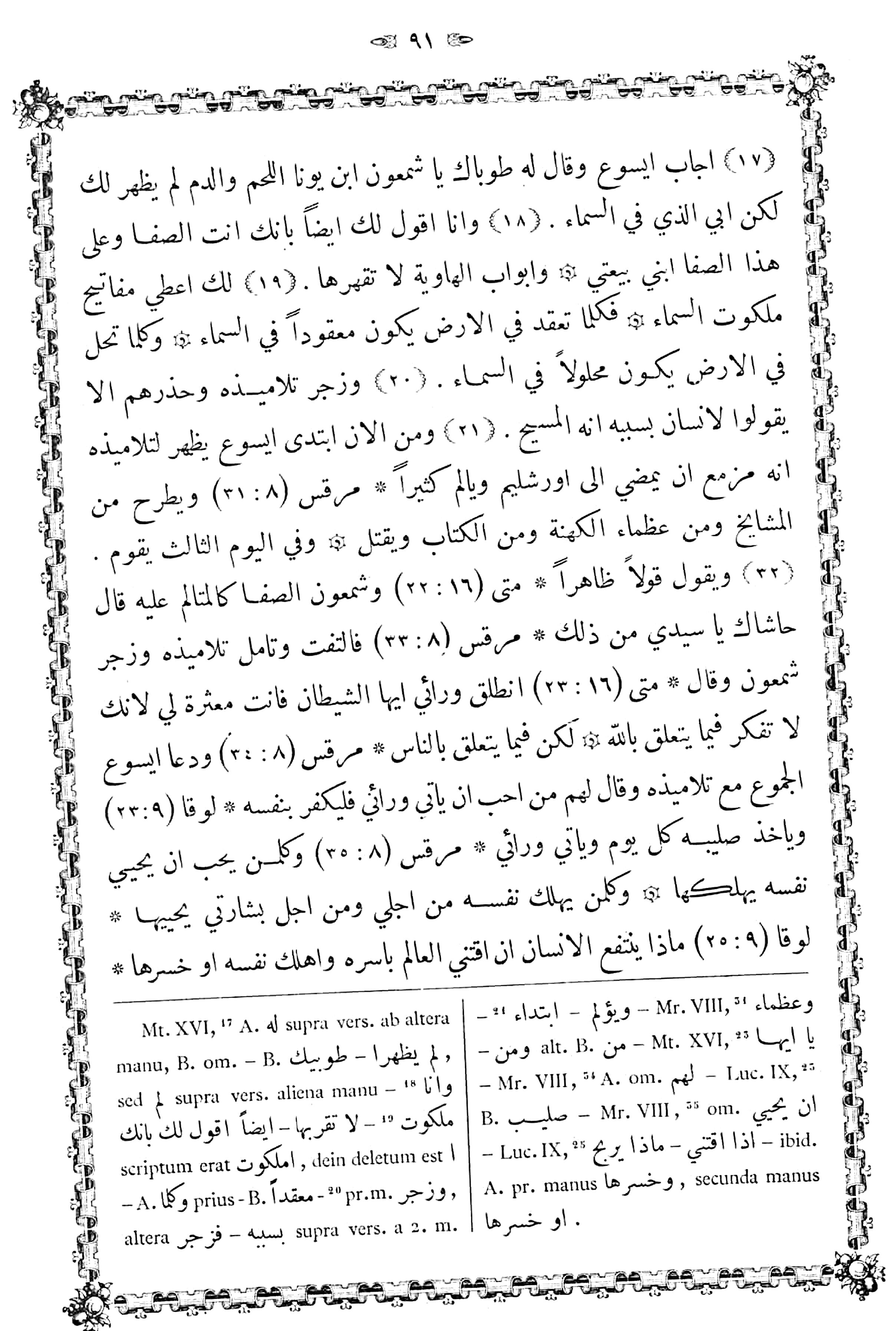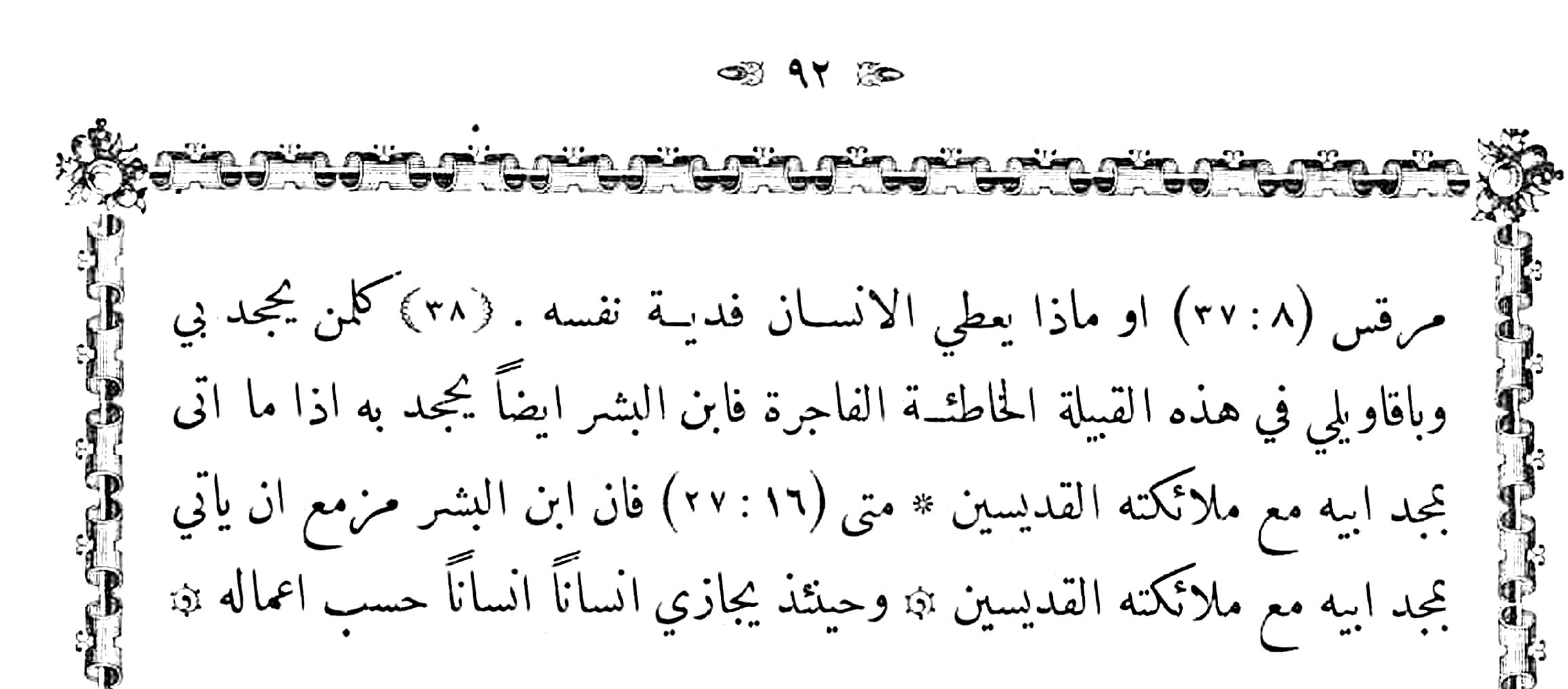
▾
Tatian, The Diatessaron
⎗←→⎘
Section XXIV.
[1] 1605 Mark ix. 1.And he said unto them, Verily I say unto you, There be here now some standing that shall not taste death, until they see the kingdom of God come1606 i.e., already come. with strength, 1607 Matt. xvi. 28b.and the Son of man who cometh in his kingdom.
[2] 1608 Matt. xvii. 1.And after six days Jesus took Simon Cephas, and James, and John his brother, [3] and brought them up into a high mountain, the three of them only. 1609 Luke ix. 29a.And while they [4] were praying, Jesus changed, and became after the fashion of another person; 1610 Matt. xvii. 2b; Luke ix. 29b.and his face shone like the sun, and his raiment was very white like the snow, and as [5] the light of lightning, so that nothing on earth can whiten1611 Or, become white. In the Pesh. the verb is transitive. In Sin. the clause is omitted. like it. 1612 Mark ix. 3b; Mark ix. 4.And there appeared [6] unto him Moses and Elijah talking to Jesus. 1613 Luke ix. 31b.And they thought that the time [7] of his decease which was to be accomplished at Jerusalem was come. 1614 Luke ix. 32.And Simon and those that were with him were heavy in the drowsiness of sleep; and with effort they roused themselves, and saw his glory, and those two men that were standing with him. [8] [Arabic, p. 93] 1615 Luke ix. 33a.And when they began to depart from him, Simon said unto Jesus, My [9] Master, it is good for us to be here: 1616 Matt. xvii. 4b.and if thou wilt, we will make here three tabernacles; one for thee, and one for Moses, and one for Elijah; 1617 Luke ix. 33c.not knowing [10] what he said, because of the fear which took possession of them. 1618 Mark ix. 6b; Matt. xvii. 5a.And while he [11] was yet saying that, a bright cloud overshadowed them. 1619 Luke ix. 34b.And when they saw Moses [12] and Elijah that they had entered into that cloud, they feared again. 1620 Matt. xvii. 5b.And a voice was heard out of the cloud, saying, This is my beloved Son, whom I have chosen; [13] hear ye therefore him. 1621 Luke ix. 36a.And when this voice was heard, Jesus was found alone. [14] 1622 Matt. xvii. 6.And the disciples, when they heard the voice, fell on their faces from the fear which [15] took hold of them. 1623 Matt. xvii. 7.And Jesus came and touched them and said, Arise, be not [16] afraid. 1624 Matt. xvii. 8.And they lifted up their eyes, and saw Jesus as he was.
[17] 1625 Matt. xvii. 9.And when they went down from the mountain, Jesus charged them, and said unto them, Tell not what ye have seen to any man, until the Son of man rise from [18] among the dead. 1626 Mark ix. 10a; Luke ix. 36c.And they kept the word within themselves, and told no man in [19] those days what they had seen. 1627 Mark ix. 10b.And they reflected among themselves, What is this [20] word which he spake unto us, I, when I am risen from among the dead? 1628 Mark ix. 11a; Matt. xvii. 10b.And his disciples asked him, and said, What is that which the scribes say, then, that Elijah [21] must first come? 1629 Mark ix. 12.He said unto them, Elijah cometh first to set in order everything, [Arabic, p. 94] and as it was written of the Son of man, that he should suffer many things, [22] and be rejected. 1630 Mark ix. 13.But I say unto you, that Elijah is come, and they knew him not, and have done unto him whatsoever they desired, as it was written of him. [23, 24] 1631 Matt. xvii. 12b.In like manner the Son of man is to suffer of them. 1632 Matt. xvii. 13.Then understood the disciples that he spake unto them concerning John the Baptist.
[25] 1633 Mark ix. 14.And on that day whereon they came down from the mountain, there met him a multitude of many people standing with his disciples, and the scribes were discussing [26] with them. 1634 Mark ix. 15.And the people, when they saw Jesus, were perplexed,1635 This rendering assumes that the diacritical point is due to a clerical error. The text as printed can hardly be translated without forcing. and in the [27] midst of their joy hastened1636 This Arabic word repeatedly represents a Syriac ran (cf. § 53, 11). A different word is so used in § 26, 21. and saluted him. 1637 Luke xiii. 31.And on that day came certain of the Pharisees, and said unto him, Get thee out, and go hence; for Herod seeketh [28] to kill thee. 1638 Luke xiii. 32.Jesus said unto them, Go ye and say to this fox, Behold, I am casting out demons, and I heal to-day and to-morrow, and on the third day I am perfected. [29] 1639 Luke xiii. 33.Nevertheless I must be watchful1640 The Syriac word used in the Peshitta is here translated just as it was translated in § 1, 79 (see note); but the Greek shows that in the present passage the Syriac word means go about (cf. Cur.). to-day and to-morrow, and on the last day I shall depart; for it cannot be that a prophet perish outside of Jerusalem.
[30] 1641 Luke ix. 38a; Matt. xvii. 14b.And after that, there came to him a man from that multitude, and fell upon his knees, and said unto him, I beseech thee, my Lord, look upon my son; 1642 Luke ix. 38b.he is my [31] only child: and the spirit cometh upon him suddenly. 1643 Luke ix. 39a; Matt. xvii. 15b.A lunacy1644 Lit. The son-of-the-roof, a Syriac phrase meaning a demon of lunacy. hath come upon [32] him, and he meeteth with evils. 1645 Mark ix. 18a.And when it cometh upon him, it beateth him about;1646 A word used in Arabic of the devil producing insanity; but here it reproduces the Peshitta. [33] and he foameth, and gnasheth his teeth, and wasteth;1647 Lit. becometh light; but a comparison with the Peshitta suggests that we should change one diacritical point and read withereth, as in Ibn-at-Tayyib’s Commentary. An equally easy emendation would be wasteth. 1648 Matt. xvii. 15c; Luke ix. 39c.and many times it hath thrown him into the water and into the fire to destroy him, and it hardly leaveth him after [34] [Arabic, p. 95] bruising him. 1649 Matt. xvii. 16.And I brought him near to thy disciples, and they could [35] not heal him. 1650 Matt. xvii. 17.Jesus answered and said, O faithless and perverse generation, till when shall I be with you? and till when shall I bear with you? bring thy son [36] hither. 1651 Mark ix. 20.And he brought him unto him: and when the spirit saw him, immediately [37] it beat him about; and he fell upon the ground, and was raging and foaming. 1652 Mark ix. 21.And Jesus asked his father, How long is the time during which he hath been thus? He [38] said unto him, From his youth until now. 1653 Mark ix. 22b.But, my Lord, help me wherein thou [39] canst, and have mercy upon me. 1654 Mark ix. 23.Jesus said unto him, If thou canst believe! All [40] things are possible to him that believeth. 1655 Mark ix. 24.And immediately the father of the child [41] cried out, weeping, and said, I believe, my Lord; help my lack of faith. 1656 Mark ix. 25.And when Jesus saw the hastening of the people, and their coming at the sound, he rebuked that unclean spirit, and said to it, Thou dumb1657 In Syriac, but not in Arabic, the word means deaf or dumb, according to the context. spirit that speakest not, I command [42] thee,1658 Ciasca’s Arabic follows Vat. ms. in inserting a that (pronoun) after thee. come out of him, and enter not again into him. 1659 Mark ix. 26.And that spirit, devil,1660 Doubtless alternative renderings of the same Syriac word (demon). cried out much, and bruised him, and came out; and that child fell as one dead, and [43] many thought that he had died. 1661 Mark ix. 27a; Luke ix. 42b.But Jesus took him by his hand, and raised him [44] up, and gave him to his father; and that child was healed from that hour. 1662 Matt. xvii. 18b; Luke ix. 43a.And the people all marvelled at the greatness of God.
[45] 1663 Mark ix. 28.And when Jesus entered into the house, his disciples came, and asked him [46] privately,1664 Lit. between themselves and him. and said unto him, Why were we not able to heal him? 1665 Matt. xvii. 20.Jesus said unto [Arabic, p. 96] them, Because of your unbelief. Verily I say unto you, If ye have faith as a grain of mustard seed, ye shall say to this mountain, Remove hence; [47] and it shall remove; and nothing shall overcome you. 1666 Mark ix. 29b.But it is impossible to cast out this kind by anything except by fasting and prayer.
[48] 1667 Mark ix. 30.And when he went forth thence, they passed through Galilee: and he would not [49] that any man should know it.1668 Or, about him. 1669 Mark ix. 31a; Luke ix. 44a.And he taught his disciples, and said unto them, [50] 1670 Mark ix. 31b.Keep ye these sayings in your ears and your hearts: for the Son of man is to be delivered into the hands of men, and they shall kill him; and when he is killed, he [51] shall rise on the third day. 1671 Luke ix. 45.But they knew not the word which he spake unto them, for it was concealed from them, that they should not perceive it; and they feared to [52] ask him about this word. 1672 Matt. xvii. 23b.And they were exceeding sorrowful.
